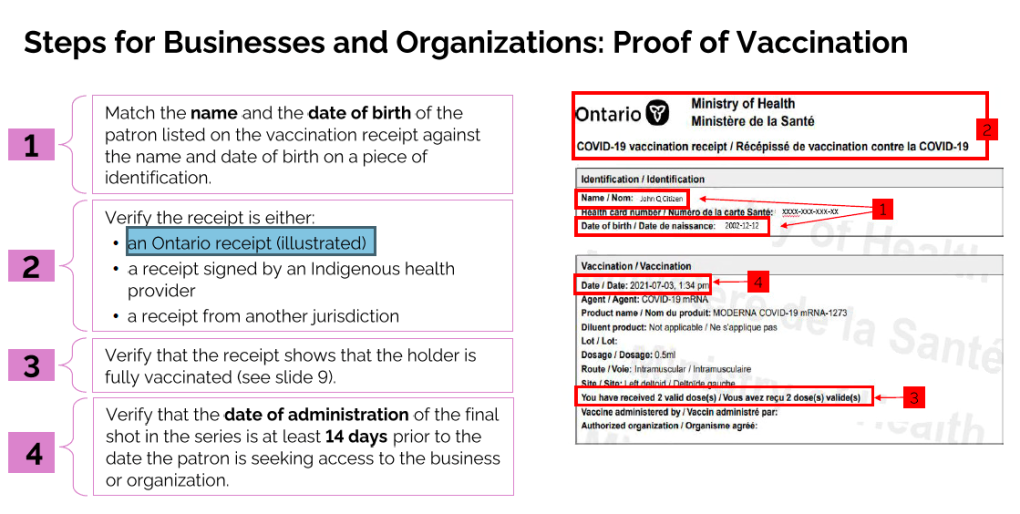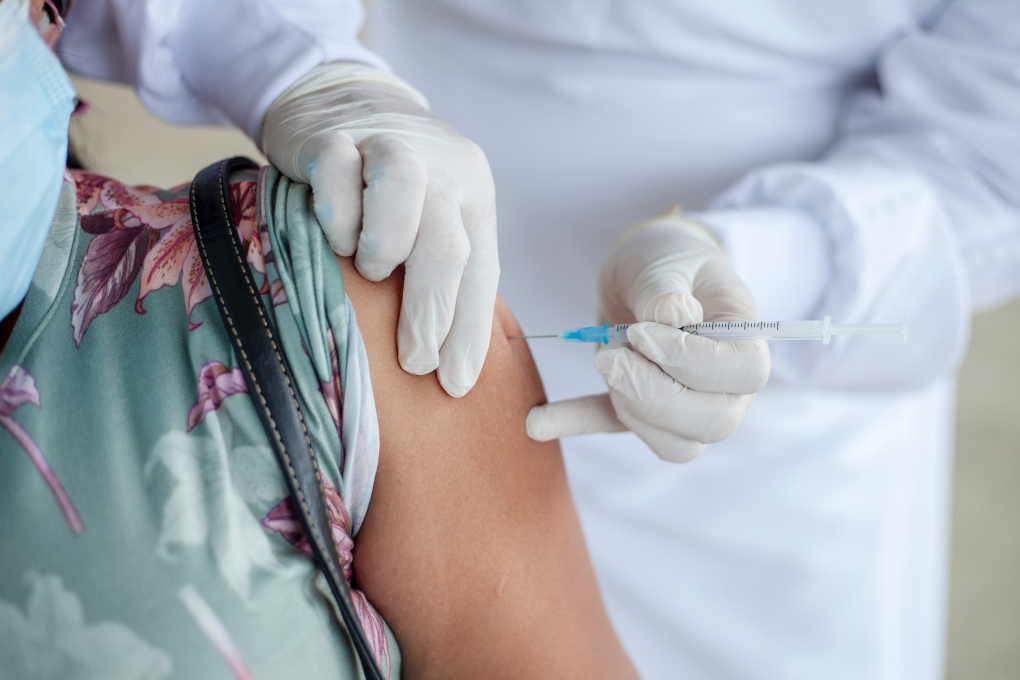Ontario releases new details on how people will prove their COVID-19 vaccine status starting Sept. 22
Ontario has released further guidance for businesses one week before COVID-19 vaccines become mandatory to enter some non-essential establishments.
Starting on Sept. 22, proof of vaccination status will be required to eat indoors at restaurants and bars, to enter a gym, movie theatre, sporting venue or concert, and to use a large meeting and event space.
Ontario residents will need to either print or download their second dose receipt from the government website until an “enhanced” certificate becomes available on Oct. 22.
They can also use a receipt signed by an Indigenous health provider or a receipt from “another jurisdiction.”
The new rules will not impact children under the age of 12 who are not yet eligible for the vaccine.
In order to enter a vaccine-mandated business, patrons will have to provide proof of their status and provide identification at the door.
Employees are being asked to match the name and date of birth listed on the vaccination receipt with the information on the ID. The receipt must be for the individual’s second dose, and employees should verify that the date of administration was at least 14 days prior.
Examples of identification documents that can be used to confirm vaccine status include a birth certificate, a citizenship card, a drivers licence, a government issued identification card, including a health card, an Indian Status Card or Indigenous Membership Card, a passport or a permanent resident card.
A photo is not required.
“The patron seeking entry is solely responsible for demonstrating that they are the legitimate holder of the receipt,” officials warned in a presentation on Tuesday.

Non-compliance by individuals or businesses may result in fines under the Reopening Ontario Act.
The province said it has decided to take a “measured approach” to enforcement of the vaccine mandate, saying that they hope to balance public safety and the risk to businesses. Officers will start with education and warnings to ensure a business is following the proper protocols.
The government has also said that in the event of harassment or threats of violence, law enforcement should be contacted.
Kaleed Rasheed, Associate Minister of Digital Government, said Tuesday the province was “on track” to deliver an “enhanced” certificate program by Oct. 22. Ontario residents will be given a QR code with their vaccination information and businesses will use an app to scan them.
“Our made-in-Ontario app will make it quicker and easier for businesses to confirm that a person's vaccine certificate is valid," Rasheed said while clarifying that patrons will have a choice to download the QR code or use their printed receipt.
Speaking on background on Tuesday morning, officials said the province has a working prototype of an app that businesses will be able to use to scan a QR code proving a patrons vaccination status.
The app is being developed in-house, the province said.
EXEMPTIONS TO VACCINE CERTIFICATE
The government also released a more comprehensive list of exemptions for the vaccine certificate program.
Proof of vaccination will not be required if someone is simply paying for an order or using a washroom of an indoor establishment where vaccination is mandatory.
While those wanting to be an indoor spectator at a horse racing track will be required to be fully vaccinated, individuals do not need two doses to place or pick up their winnings.
Customers will also not need to be fully vaccinated to make a retail purchase.
While indoor sport spectators need to provide proof of vaccination, those “actively participating in an organised sport” do not.
The province is also distinguishing between attending a wedding or funeral ceremony, in which proof of vaccination is not necessary, and the associated social gathering, where guests must be fully vaccinated.
Regular exemptions also apply for those with written notification from a health practitioner stating that they have a medical reason for not getting the shot.
ONTARIO IN ‘LAST MILE’ OF VACCINE ROLLOUT
Officials said that Ontario is now in “the last mile” of its vaccine rollout. In order to reach the coveted 90 per cent coverage rate—which doctors have said is necessary to curb the spread of the Delta variant—1.5 million people will need to be fully vaccinated.
As of Tuesday, 84.5 per cent of eligible Ontarians aged 12 and up have received at least one dose of a COVID-19, while about 78.2 per cent are considered fully vaccinated with two shots.
The province has said that their “last mile” strategy is to target populations with low vaccination rates. This includes more than 550 school-based clinics that are “planned or operational” and the use of the GO-VAXX bus, which has been travelling to community hubs, sporting events, malls, fairs, markets and post-secondary institutions.

Ontario’s two COVID-19 phone lines—the one to book a vaccine and the one to ask questions about the shot—are also merging.
The new Provincial Vaccine Contact Centre (1-833-943-3600) will be operational between 8 a.m. and 8 p.m. seven days a week.
A new service is also being launched in the coming weeks in partnership with the Hospital for Sick Kids offering by-appointment consultations for youth and their families.
Additional groups have been added to the eligibility list for a third booster of COVID-19 vaccine.
Ontario began offering third doses of a COVID-19 vaccine to individuals most at risk of serious illness in mid August. At the time, the following people could get a third shot: transplant recipients, patients with hematological cancers, recipients of an anti-CD20 agent and residents of high-risk settings such as long-term care homes, retirement homes and First Nations elder care lodges.
On Tuesday, the province expanded that list, adding the following groups:
- Those undergoing active treatment for solid tumors and hematologic malignancies
- Those who are in receipt of a solid-organ transplant and taking immunosuppressive therapy
- Those who are in receipt of chimeric antigen receptor (CAR)-T-cell or hematopoietic stem cell transplants
- Those with moderate or severe primary immunodeficiency
- Stage 3 or advanced untreated HIV infection and those with acquired immunodeficiency syndrome
- Those undergoing active treatment with the following therapies: high-dose systematic corticosteroids, alkylating agents, antimetabolites, tumor-necrosis blockers and anti-B cell therapies
Officials say that more than 30,000 third doses have been administered in Ontario.
CTVNews.ca Top Stories

W5 Investigates A 'ticking time bomb': Inside Syria's toughest prison holding accused high-ranking ISIS members
In the last of a three-part investigation, W5's Avery Haines was given rare access to a Syrian prison, where thousands of accused high-ranking ISIS members are being held.
Trudeau Liberals' two-month GST holiday bill passes the House, off to the Senate
The federal government's five-page piece of legislation to enact Prime Minister Justin Trudeau's promised two-month tax break on a range of consumer goods over the holidays passed in the House of Commons late Thursday.
Irregular sleep patterns may raise risk of heart attack and stroke, study suggests
Sleeping and waking up at different times is associated with an increased risk of heart attack and stroke, even for people who get the recommended amount of sleep, according to new research.
California man who went missing for 25 years found after sister sees his picture in the news
It’s a Thanksgiving miracle for one California family after a man who went missing in 1999 was found 25 years later when his sister saw a photo of him in an online article, authorities said.
As Australia bans social media for children, Quebec is paying close attention
As Australia moves to ban social media for children under 16, Quebec is debating whether to follow suit.
Notre Dame Cathedral: Sneak peek ahead of the reopening
After more than five years of frenetic reconstruction work, Notre Dame Cathedral showed its new self to the world Friday, with rebuilt soaring ceilings and creamy good-as-new stonework erasing somber memories of its devastating fire in 2019.
Canada Post temporarily laying off striking workers, union says
The union representing Canada Post workers says the Crown corporation has been laying off striking employees as the labour action by more than 55,000 workers approaches the two-week mark.
Can't resist Black Friday weekend deals? How to shop while staying within your budget
A budgeting expert says there are a number of ways shoppers can avoid getting enveloped by the sales frenzy and resist spending beyond their means.
Montreal shopping mall playing 'Baby Shark' song to prevent unhoused from loitering
A shopping mall and office complex in downtown Montreal is being criticized for using the popular children's song 'Baby Shark' to discourage unhoused people from loitering in its emergency exit stairwells.


































